Global Survey: User Preferences for Message Security, Privacy and Portability
Our extensive survey conducted across seven countries and four languages reveals a global consensus: users significantly prioritize privacy and security in messaging apps, with a growing interest in features like portability and control over data storage.

The XMTP community is building a messaging protocol that puts privacy, security and portability at the forefront — but how much do people care about these things when choosing a messaging app?
We surveyed over 1,000 people across 7 countries in 4 languages to find out. The survey results reveal that users care deeply about message privacy and security when deciding how to communicate with friends and family.
There’s also a clear interest in portability across apps to solve for lost contacts and/or messages; and while most people say they want control over where their messages are stored, their understanding of storage options remains limited.
Survey Methodology and Research Goals
👤 Participants: 1,059 | 🌍 Countries: 7 | 💬 Languages: 4
The 28-question survey was given to 1,059 participants across 7 countries: Argentina, Egypt, India, Indonesia, Nigeria, Russia, and the United States, providing a broad view of global user preferences and concerns. The results were analyzed by the XMTP Labs UX Research team, as well as an external data analyst consultant.
Some of the primary research goals included obtaining a greater understanding of the following:
- To what extent do users prioritize privacy and security when choosing messaging apps?
- Do users want all of their messages and message history in every chat app they use?
- To what extent do users want control over data storage features of their preferred messaging apps?
The XMTP Labs team combines survey insights with ongoing behavioral UX research to fully understand user needs related to private and secure chat applications.
Privacy and Security: A Global Priority
Our research highlighted the universal value that people place on privacy and security in messaging apps, across various regions. When asked, "When selecting which chat apps to use, how important is privacy and security to you?"
67% of all survey participants globally said that privacy and security was 'very important' to them when selecting which chat apps to use.
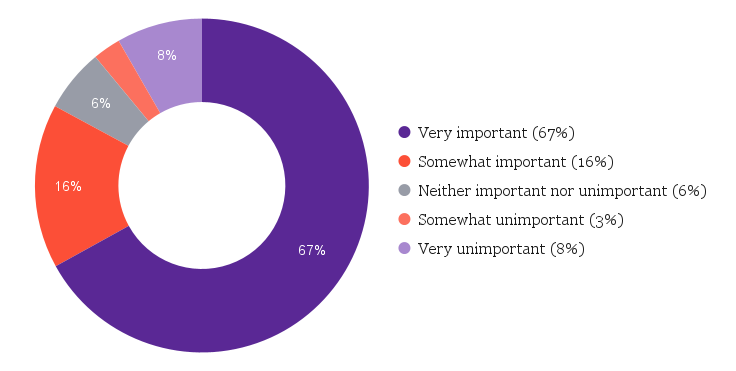
This suggests a strong global concern for private messaging and app integrity.
Notably, only a small fraction of users find privacy and security to be “very unimportant” (8%) or “somewhat unimportant” (3%). This highlights the crucial role that privacy and security play in user preferences and the chances of them adopting a messaging app.
When we look at the responses to this question by country, we see regional differences in sentiment.
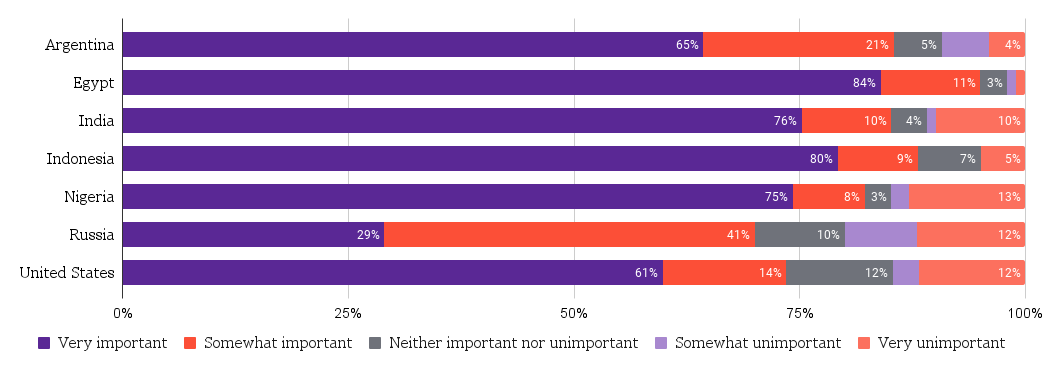
Participants in Egypt and Indonesia highly value privacy when choosing chat apps, with 84% of Egyptians and 80% of Indonesians rating it as 'Very Important.' In contrast, only 29% of Russian participants consider privacy and security 'Very Important' in their choice of chat apps.
This could be an indicator of cultural differences in attitudes towards the need and expectation for privacy more broadly.
Message Security in an Interoperable Network
Given that XMTP Labs is building a protocol that will allow people to access their message history across different chat apps, we wanted to understand people’s sentiment about privacy and security in an interoperable network.
In the survey, participants were asked about using two chat apps with the same messages and conversation history, each chosen for their different features. In an interoperable network:
70% of participants wanted to have the highest levels of message security and privacy when using apps that share messaging content and history.
Additionally, they are willing to sacrifice seeing their chat history across apps in order to have the highest possible standard of security.
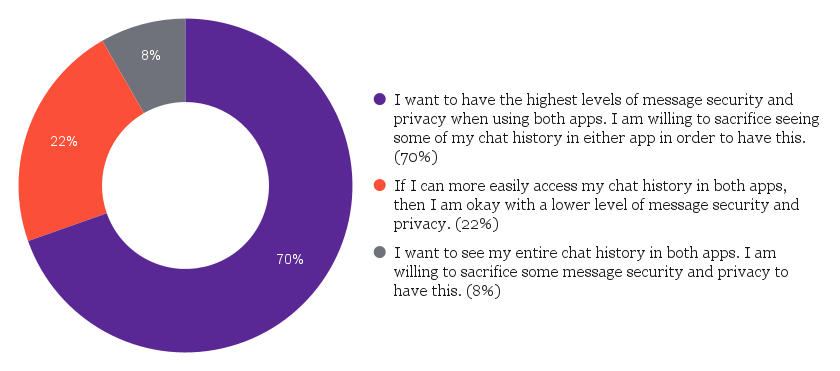
This sentiment is echoed in a follow-up question about the trade off between a chat app being easy to use versus being highly secure. 74% of participants globally said that their chat apps “should be as private and secure as possible.”
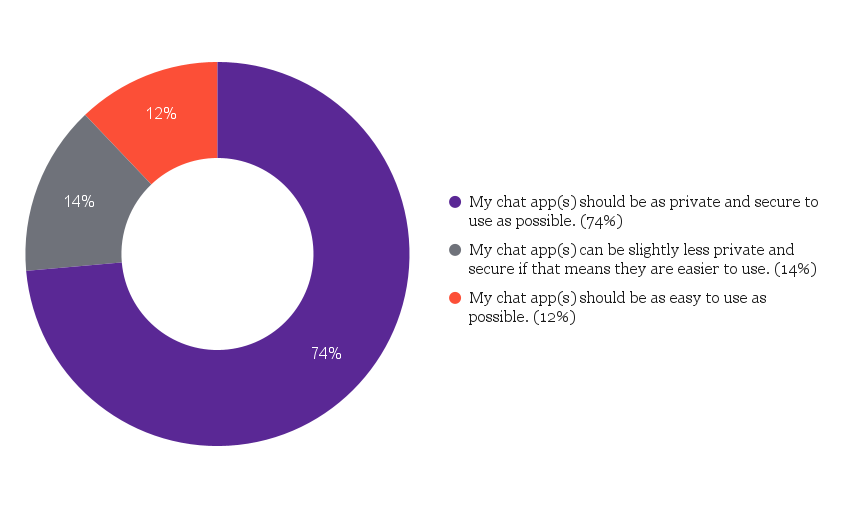
The predominant user preference for privacy and security over ease of use in messaging apps underlines a significant shift in consumer priorities. It also signals a clear mandate to developers: robust security measures and protecting privacy are not just value-added features but increasingly becoming fundamental expectations.
Message and Data Portability
When it comes to switching or ceasing the use of certain messaging apps, the majority of participants expressed the following frustrations:
- Losing chat history and old conversations
- Worrying they are missing messages from people
- Worrying that others are missing messages from them
Nearly 3 out of 4 participants are interested in the idea of multiple chat apps with the same messages and conversation history.
When asked to consider how they feel about having two chat apps with the same messages and conversation history, 40% of participants liked and found utility in the idea, and 34% were interested and curious to learn more.
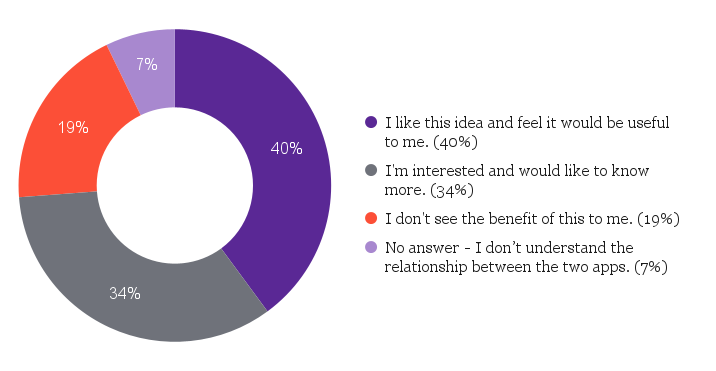
This openness to interoperability is significant among users, but it hinges on having sufficient transparency to address their privacy and security concerns, as well as a clear understanding of the risks associated with compromised communication networks.
In follow up to the above question, participants were given the opportunity to answer the below open-ended question:
What would you want to know about the relationship between two chat apps that share messages and conversation history, if anything?
Many comments highlighted a desire for clear information from the apps regarding the methods of data sharing and encryption. Some questions that participants posed in the open-ended responses include:
- "Which of the two applications stores my personal data, and if there is a hack in one of the two applications, will it affect the other or not?"
- "What do they do with the information about my messages and my device?"
- "First of all, it’s interesting which companies own these chats... secondly, it’s interesting how exactly the interaction between them will go - will there be a single authorization system, will the chats be completely duplicated, or will they be supplemented?"
While users are curious and open to the many benefits of interoperability, they seek a clear explanation of the extent to which these apps access their messages and device information. With transparency, clarity and assurance from the app developers, there would be a greater willingness to adopt these applications.
The Power of Choice in Data Storage
More than half of the participants consider the storage location of their messaging data important, influencing their choice of which messaging apps to use.
The majority of users want options when it comes to where their message data is stored.
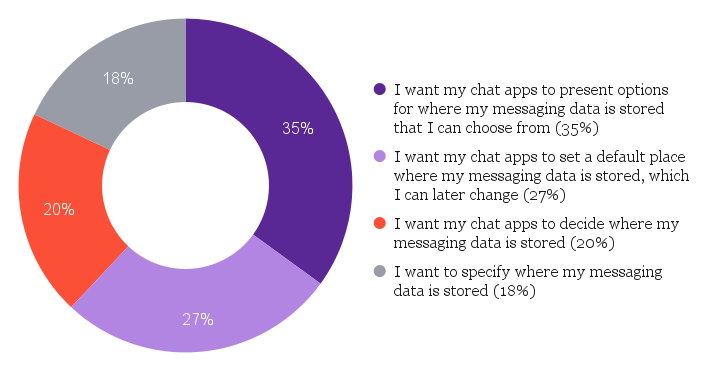
The majority expressed a desire to choose the location of their data storage, or at least have an application that offers them various options for storing their messaging data. This preference is a direct reflection of the substantial emphasis that participants have placed on the importance of privacy and security throughout the survey.
Awareness and Understanding of Data Storage Options
Despite the clear preference for control over data storage, there is a notable gap in participants' awareness and understanding of the different data storage options available.
Many people, while eager to have control over their data, displayed limited knowledge about the types of storage options, such as cloud-based versus local storage, and the associated security implications of each.
Less than 26% of people surveyed were familiar with the concepts of storing data on company servers, third-party platforms, CDNs, and decentralized nodes.
That said, participants who stated that they care where their data is stored do have a slightly increased familiarity with data storage system. This shows a positive correlation between understanding data storage and expressing that it is important when choosing which applications they use.
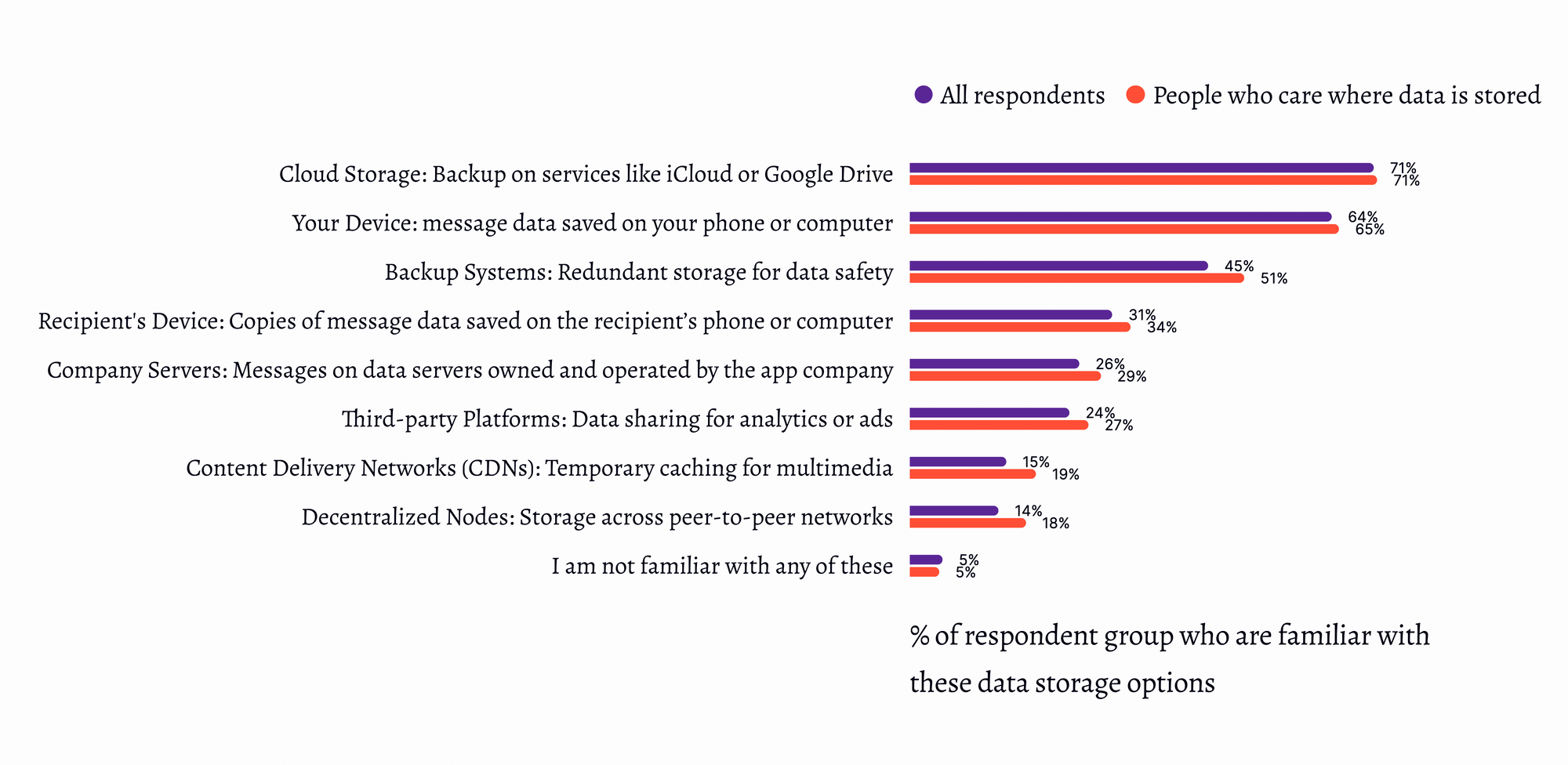
While there is a clear desire for control over data storage among users, it's also evident that their actual understanding of data storage options may not be as comprehensive as their expressed need for control.
This highlights the importance of bridging the knowledge gap to enable users to make informed choices that truly reflect their preferences and needs. As awareness of privacy concerns continues to grow among users, providing them with the capability to manage aspects of their personal data or ensuring transparency about where their data is stored becomes a critical factor influencing their decision to adopt a particular app.
XMTP and the Future of Messaging
XMTP’s emphasis on inbox portability and control over identity and communications aligns with the growing user needs and preferences identified in the survey. This is consistent with our mission at XMTP Labs: ensuring that XMTP plays a crucial role in normalizing the new reality of messaging that puts privacy, data portability, and the power of choice in the hands of end users.
As users increasingly seek control, transparency, security and portability in their messaging experiences, we invite developers everywhere to explore, contribute to and build with XMTP!
Why? Because people everywhere deserve the right to own and control their messages, protected from surveillance and monopolistic control by any single entity.
XMTP Newsletter
Join the newsletter to receive the latest updates in your inbox.
